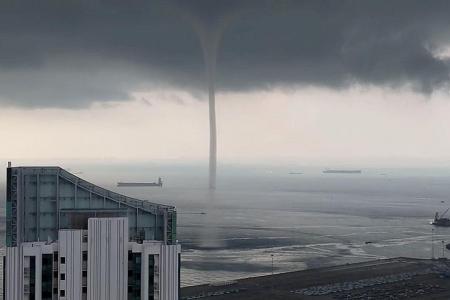Waterspout off Singapore coast sparks climate debate
Experts say unusual and extreme weather events occur due to climate change and also by chance
A waterspout developed off the southern coast of Singapore on Saturday.
The phenomenon, as well as unseasonably cold or warm spells around the world, have people asking yet again: Are more unusual and extreme weather incidents here and around the world because of climate change, or an unexpected confluence of factors?
It is a bit of both, climate experts say.
Professor Benjamin Horton, chair of the Nanyang Technological University's (NTU) Asian School of the Environment and principal investigator at the Earth Observatory of Singapore, said extreme weather events may well happen by chance but could also signal a dangerous, human-made shift in the Earth's climate.
"2019, just like its predecessor, has been marked by extreme weather, including heat, cold, heavy rainfall and high winds, with widespread impacts on public safety, transport, energy and health," Prof Horton said, highlighting the weather incident on Saturday in which a waterspout occurred near the Tanjong Pagar Terminal.
The warm air temperatures in Singapore, coupled with light winds, produced the required levels of humidity and warm ocean temperature to form the waterspout, said Prof Horton.
While waterspouts are not uncommon, they could be created by weather effects caused by global warming. And natural cycles cannot by themselves explain the recent number of record-breaking extreme weather events happening around the world, he added.
"Something else is happening too: The Earth is getting warmer, with significantly more moisture in the atmosphere," he said.
Decades of data have shown that a long-term build-up of greenhouse gases in the atmosphere is trapping heat and warming up the land, oceans, and atmosphere.
"Seventeen of the 18 warmest years in the 136-year global temperature record all have occurred since 2001, with the exception of 1998. Earth as of the start of April 2019 had experienced 411 consecutive months warmer than the global average," Prof Horton said.
Then again, odd weather patterns might occur in quick succession purely by chance.
Waterspouts are fairly common in Singapore, said Associate Professor Adam Switzer, Associate Chair (Academic) at the NTU Asian School of the Environment and also principal investigator at the Earth Observatory of Singapore.
"Waterspouts are mostly harmless and pass in a few minutes. But it is important to stay away from them if they come onto the shore as they carry strong winds with them," said Prof Switzer.
"The weather we are experiencing is seasonal, and it is common for intense thunderstorms to occur at this time of year."
The National Environment Agency declined to comment on the recent weather events.
However, its website indicates an average of three waterspout occurrences in waters off Singapore each year.
The Republic also experiences around 167 thunderstorm days and 185 lightning days a year, with thunderstorms being more prevalent from April to May, and from October to November.
Get The New Paper on your phone with the free TNP app. Download from the Apple App Store or Google Play Store now


